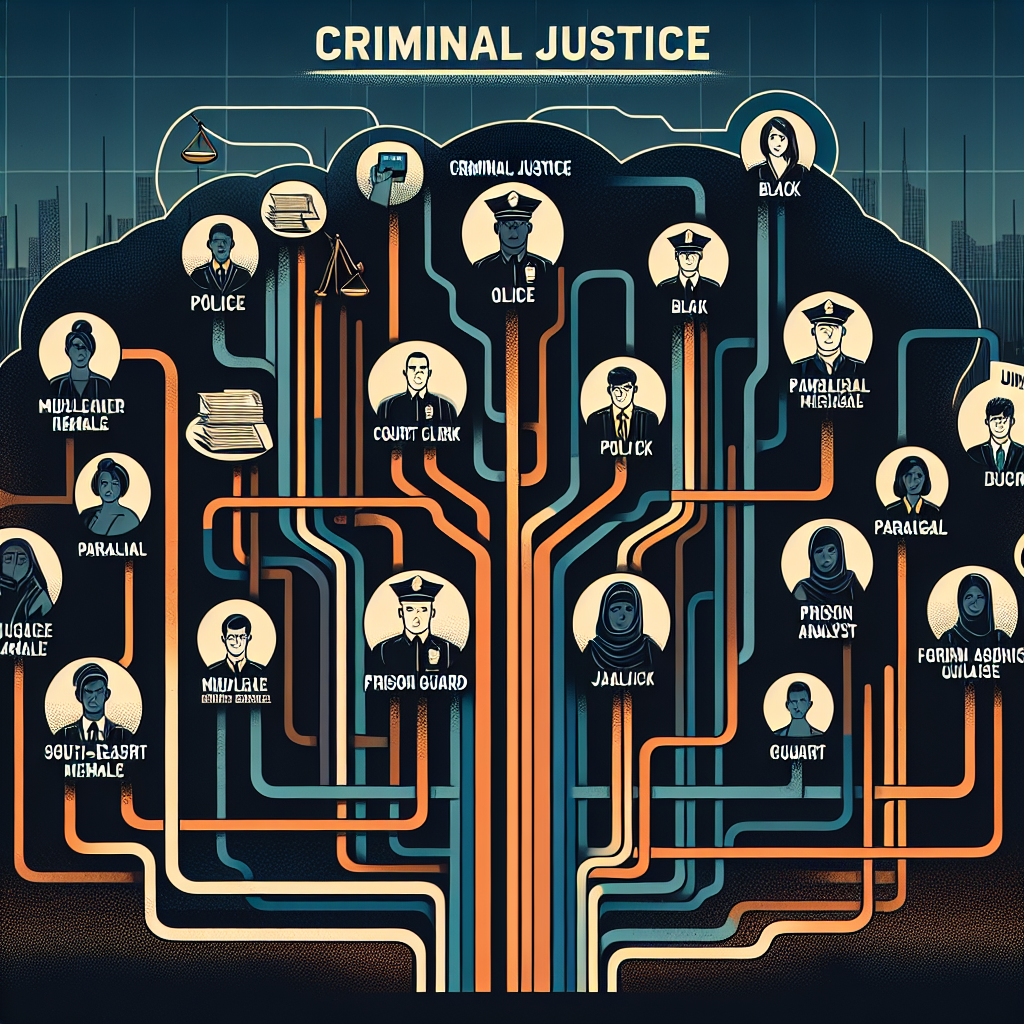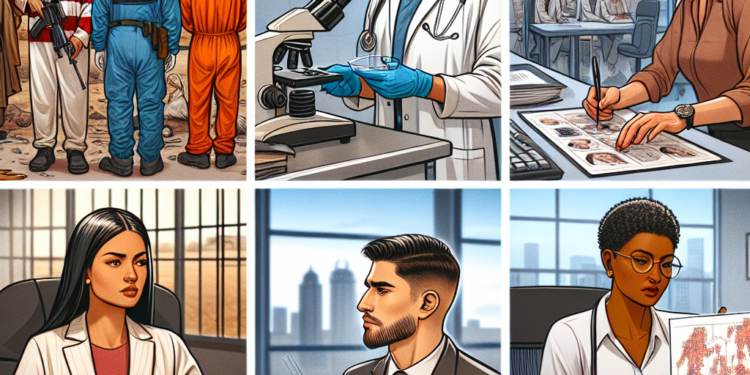Criminal Justice Degree Jobs. Earning a degree in criminal justice opens the door to a variety of career opportunities. Whether you’re passionate about law enforcement, interested in the legal system, or drawn to social services, a criminal justice degree can serve as a stepping stone to a rewarding career. In this article, we’ll explore several career paths you can pursue with a criminal justice degree and discuss the roles and responsibilities associated with each. Additionally, we will delve into the essential skills required for success and strategies for advancing your career in this dynamic field.
Understanding the Criminal Justice Degree

A criminal justice degree provides students with a comprehensive understanding of the legal and correctional systems. It covers various disciplines, including criminology, sociology, psychology, and law. This interdisciplinary approach equips graduates with the skills and knowledge needed to work in diverse roles within the criminal justice field.
The Interdisciplinary Nature of Criminal Justice
A key component of a criminal justice degree is its interdisciplinary nature. Students are exposed to a variety of subjects that together provide a holistic understanding of the systems in place Criminal Justice Degree Jobs. By integrating elements of sociology, law, and psychology, the program ensures that graduates can approach issues from multiple perspectives. This broad base of knowledge is crucial when working in an ever-evolving field that requires adaptability and a multifaceted understanding of complex issues.
Core Areas of Study
The curriculum typically includes subjects such as:
- Criminology: The study of crime, its causes, and its effects on society. Criminology courses allow students to explore theories of criminal behavior, understand crime trends, and evaluate the effectiveness of crime prevention strategies.
- Law Enforcement: Training in policing, investigation, and public safety. Courses in this area provide a foundation in the practical aspects of law enforcement, including tactical operations, emergency response, and community policing.
- Corrections: Understanding the prison system, rehabilitation, and probation. Correctional studies focus on the management of correctional facilities, inmate behavior, and the development of rehabilitation programs aimed at reducing recidivism.
- Legal Studies: Insights into the court system and legal processes. Legal studies emphasize understanding the structure and function of the judicial system, preparing students for roles within the courtroom and legal support services.
- Sociology and Psychology: Exploring the social and psychological aspects of criminal behavior. These courses delve into societal influences on crime, the psychological motivations behind criminal acts, and the impact of crime on communities.
The Practical Application of Knowledge
A criminal justice degree is not just theoretical; it involves practical application as well Criminal Justice Degree Jobs. Internships and fieldwork are often integral parts of the curriculum, providing students with real-world experience. These opportunities allow students to apply their classroom knowledge to actual cases and scenarios, bridging the gap between theory and practice. This hands-on experience is invaluable in preparing graduates for the challenges they will face in their careers.
Career Paths in Criminal Justice

With a criminal justice degree, you can pursue a variety of career paths. Here are some of the most popular options:
Law Enforcement Careers
A career in law enforcement is often the first choice for criminal justice graduates. Police officers and detectives play a crucial role in maintaining public safety and enforcing laws.
- Police Officer: Responsible for patrolling neighborhoods, responding to emergencies, and investigating crimes. Police officers also work to build trust within communities. Their day-to-day activities may include traffic enforcement, crisis intervention, and community outreach programs aimed at crime prevention.
- Detective: Focused on investigating crimes, collecting evidence, and apprehending suspects. Detectives often specialize in certain types of crimes, such as homicide or cybercrime. They work closely with other law enforcement agencies and utilize advanced investigative techniques and technologies to solve complex cases.
- Federal Agent: Working for federal agencies like the FBI or DEA, federal agents investigate violations of federal law. These roles often require specialized skills and training and may involve working on high-profile cases with national security implications.
Legal and Court System Careers
If you’re interested in the legal side of criminal justice, there are several roles within the court system.
- Paralegal: Assists lawyers by conducting research, drafting documents, and organizing case files. Paralegals are essential in preparing for trials and hearings. They must have a keen attention to detail and be proficient in legal research and writing.
- Court Clerk: Manages court records, schedules cases, and assists judges during trials. Court clerks ensure that the legal process runs smoothly. Their organizational skills and knowledge of court procedures are vital in maintaining the efficiency of the judicial system.
- Probation Officer: Works with offenders who are sentenced to probation instead of prison. They monitor progress, help with rehabilitation, and ensure compliance with court orders. Probation officers play a critical role in the reintegration of offenders into society, often serving as a liaison between the court and community resources.
Corrections and Rehabilitation Careers
Working in corrections involves managing and rehabilitating individuals who are incarcerated or on probation.
- Correctional Officer: Oversees inmates in jails and prisons, ensuring safety and security. Correctional officers also facilitate rehabilitation programs. They are responsible for the daily management of inmates, including enforcing rules and supervising activities.
- Rehabilitation Specialist: Focuses on helping offenders reintegrate into society Criminal Justice Degree Jobs. They develop programs and offer support to reduce recidivism. Rehabilitation specialists work with a variety of stakeholders, including social service agencies and community organizations, to provide comprehensive support for offenders.
- Juvenile Counselor: Works specifically with young offenders, providing counseling and support. Juvenile counselors aim to address the unique needs of youth in the criminal justice system, focusing on education and behavioral interventions to prevent future criminal activity.
Social Services and Advocacy Careers
For those passionate about helping others, social services offer rewarding opportunities.
- Social Worker: Assists individuals and families in overcoming challenges, such as substance abuse or domestic violence. Social workers advocate for clients and connect them with resources. They often work in collaboration with law enforcement and legal professionals to provide holistic support.
- Victim Advocate: Supports victims of crime by providing information, resources, and emotional support throughout the legal process. Victim advocates help navigate the often complex legal system and ensure that victims’ rights are upheld.
- Community Outreach Coordinator: Works to build relationships between the criminal justice system and the community. They develop programs and initiatives aimed at reducing crime and enhancing public safety through community engagement and education.
Skills and Qualities for Success

To succeed in a criminal justice career, certain skills and qualities are essential:
Communication Skills
Effective communication is crucial for interacting with diverse populations and conveying information clearly. Whether testifying in court, interviewing witnesses, or working with community members, clear and concise communication can make all the difference. Strong communication skills also foster better teamwork and collaboration among colleagues in the field.
Critical Thinking
The ability to analyze situations, solve problems, and make informed decisions is vital in criminal justice roles. Professionals in this field often face complex and high-pressure situations that require quick, yet thoughtful decision-making. Critical thinking enables individuals to evaluate evidence, assess risk, and determine the best course of action.
Empathy and Compassion
Understanding and compassion are necessary for working with victims, offenders, and communities. These qualities help build trust and rapport, which are essential for effective intervention and support. Empathy also aids in conflict resolution and can lead to more positive outcomes in challenging situations.
Physical Fitness
Criminal Justice Degree Jobs. Many law enforcement and corrections roles require physical stamina and strength. Physical fitness is important not only for personal safety but also for the effective performance of duties such as pursuing suspects or maintaining order in correctional facilities. Regular fitness training can enhance overall job performance and reduce the risk of injury.
Attention to Detail
Accuracy is important in legal, investigative, and correctional work. Attention to detail ensures that procedures are followed correctly and that documentation is thorough, which is essential for legal compliance and successful case resolution. This skill also helps in identifying discrepancies or potential issues that could impact the outcome of a case.
Advancing Your Career
Once you’ve entered the criminal justice field, there are opportunities for advancement and specialization.
Continuing Education
Pursuing advanced degrees or certifications can enhance your career prospects. Consider:
- Master’s Degree in Criminal Justice: Offers deeper insights and prepares you for leadership roles. A master’s program may include advanced studies in policy analysis, ethics, and criminal justice administration.
- Specialized Training: Certifications in areas like forensics or cybercrime can open new career paths. Specialized training allows you to develop expertise in niche areas of the field, increasing your value to employers and your potential for career advancement.
- Professional Development Courses: Short-term courses on topics like conflict resolution, mediation, or management skills can be beneficial. These courses help you stay current with industry developments and can improve your effectiveness in your current role.
Networking and Professional Development
Joining professional organizations, attending conferences, and connecting with peers can help you stay informed about industry trends and opportunities.
- Professional Associations: Joining organizations such as the American Criminal Justice Association (ACJA) or the National Association of Legal Assistants (NALA) can provide valuable resources and networking opportunities.
- Conferences and Seminars: Attending industry events allows you to learn from experts, share experiences, and gain insights into emerging trends and technologies.
- Mentorship Programs: Engaging in mentorship, either as a mentor or mentee, can provide guidance and support in navigating your career path and achieving your professional goals.
Criminal Justice Degree Jobs
A criminal justice degree offers a wide range of career opportunities in law enforcement, legal systems, corrections, and social services. By understanding the various paths available and the skills required, you can make informed decisions about your future. Whether you aim to uphold the law, support victims, or rehabilitate offenders, a criminal justice degree can be your gateway to a fulfilling career.
Explore your interests, pursue further education, and develop the skills needed to make a positive impact in the field of criminal justice. By staying informed and engaged, you can contribute to the safety and well-being of your community and advance in a dynamic and rewarding career.




